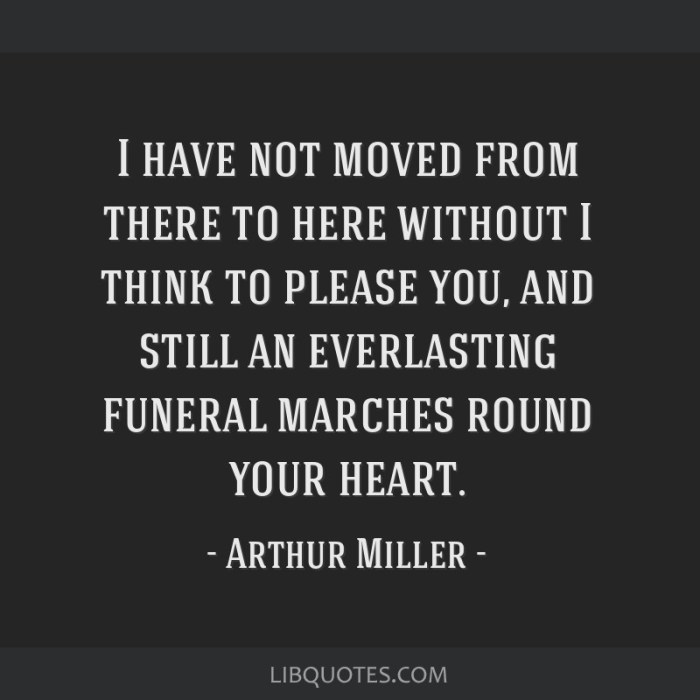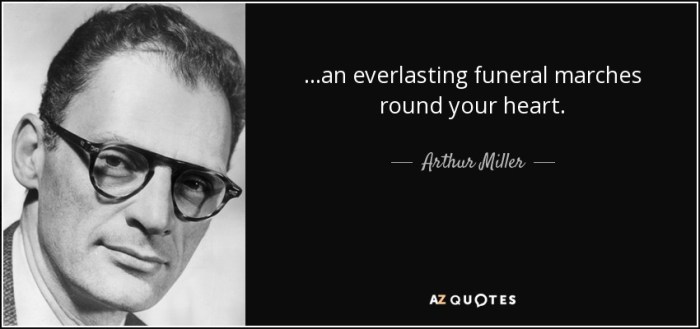A funeral marches round your heart, a haunting and evocative phrase that encapsulates the profound sorrow and despair of loss. This metaphor, rich in literary devices and historical context, offers a unique lens through which to examine the complexities of grief.
As the heart becomes the epicenter of mourning, the funeral march serves as a poignant symbol of the procession of emotions that accompany loss. The steady, relentless rhythm of the march mirrors the ebb and flow of grief, while the somber tones convey the weight of sorrow that weighs heavy upon the soul.
Analyze the Metaphor

The metaphor “a funeral marches round your heart” depicts the profound emotional pain and sense of loss associated with grief. It suggests that the weight of sorrow feels like a relentless march, encircling the heart and consuming the individual with its somber rhythm.
This metaphor is often used in literature, music, and other forms of art to convey the intensity and duration of grief. For instance, in Emily Dickinson’s poem “Because I could not stop for Death,” the speaker describes grief as a “carriage” that “passed me, and there passed the School Where Children strove at Recess – in the Ring – We passed the Fields of Gazing Grain – We passed the Setting Sun – Or rather – He passed Us – The Dews drew quivering and chill – For only Gossamer, my Gown – My Tippet – only Tulle.”
The poem’s imagery depicts the journey of grief as a solemn procession that takes the speaker through various stages of loss, from the initial shock to the lingering pain.
The emotional impact of this metaphor is significant. It conveys the sense of heaviness and despair that accompanies grief. The relentless march suggests that the pain is constant and overwhelming, leaving the individual feeling trapped and consumed by their sorrow.
Identify Literary Devices

Personification
The phrase “a funeral marches round your heart” uses personification by giving the abstract concept of grief human qualities. The verb “marches” suggests that grief is an active force that moves relentlessly around the heart, creating a sense of urgency and inevitability.
Metaphor
As discussed earlier, the phrase itself is a metaphor that compares grief to a funeral march. This comparison evokes the somber and mournful atmosphere associated with funerals, reinforcing the sense of loss and despair.
Symbolism, A funeral marches round your heart
The heart is often used as a symbol of emotions and feelings. In this phrase, the heart represents the center of the individual’s emotional experience, where grief resides and exerts its influence.
Explore Historical Context
The phrase “a funeral marches round your heart” originated in the Victorian era, a time of widespread mourning and grief due to high mortality rates and the loss of loved ones in wars and epidemics.
During this period, funerals were elaborate and highly ritualized events that played a significant role in the grieving process. The phrase captures the collective experience of loss and the overwhelming sense of sorrow that permeated society.
Over time, the phrase has evolved in its usage but retains its evocative power to convey the profound emotional pain associated with grief.
Compare and Contrast

“A funeral marches round your heart” vs. “A heavy heart”
Both phrases describe the weight of grief, but “a funeral marches round your heart” is more vivid and dynamic. The image of a marching funeral procession suggests a relentless and consuming force, while “a heavy heart” simply conveys a sense of heaviness.
“A funeral marches round your heart” vs. “A broken heart”
“A funeral marches round your heart” emphasizes the ongoing nature of grief, while “a broken heart” suggests a more sudden and intense loss. The marching funeral procession represents the constant presence of sorrow, whereas a broken heart implies a shattered and irreparable state.
Analyze Symbolism: A Funeral Marches Round Your Heart
The heart, as mentioned earlier, is a symbol of emotions and feelings. The funeral march represents the process of mourning and grief. Together, the phrase “a funeral marches round your heart” symbolizes the profound emotional pain and sense of loss that accompanies grief.
The relentless march suggests that grief is an ongoing journey, a constant companion that circles the heart and leaves an enduring impact on the individual’s emotional well-being.
Quick FAQs
What is the significance of the heart in the metaphor “a funeral marches round your heart”?
The heart is often seen as the center of emotions, and in this metaphor, it represents the seat of grief. The funeral march encircles the heart, symbolizing the all-consuming nature of sorrow that envelops the entire being.
How does the rhythm of the funeral march contribute to the meaning of the metaphor?
The steady, relentless rhythm of the march mirrors the cyclical nature of grief. There are moments of intense pain, followed by periods of relative calm, but the underlying sorrow persists, like a constant drumbeat in the background.
What historical context influenced the development of this metaphor?
The metaphor of a funeral march has been used for centuries to describe the experience of grief. In Victorian England, for example, elaborate funeral processions were common, and the somber music played during these events became associated with the intense emotions of loss.